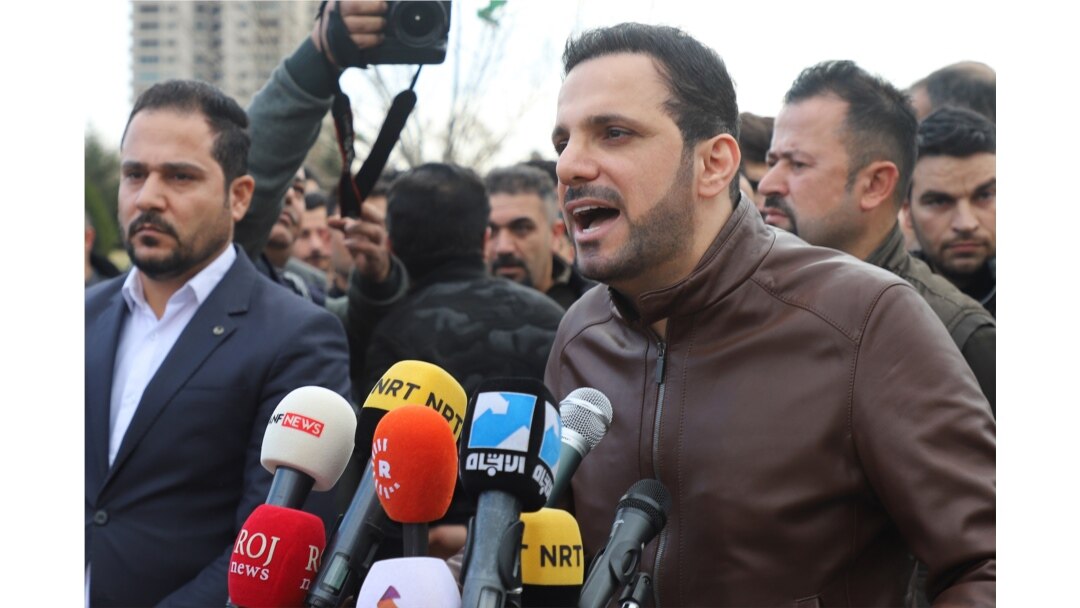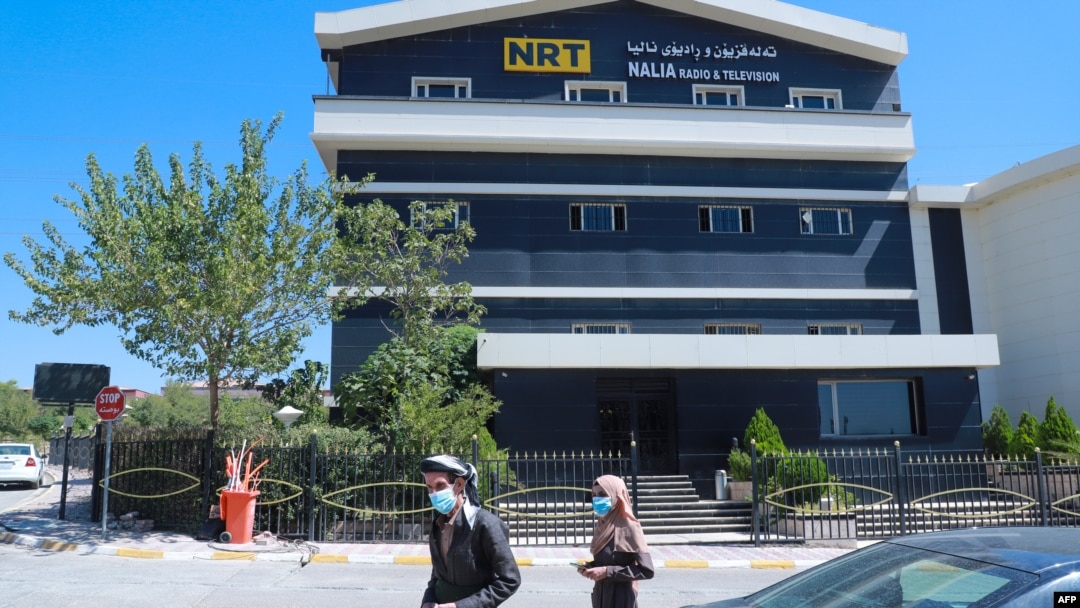A prominent Iraqi Kurdistan television network that has been covering anti-government protests that are taking place across the autonomous region was taken off the air Monday.
The Kurdistan Regional Government has suspended Nalia Radio and Television (NRT) broadcasts for one week, according to an order issued by the Ministry of Culture and Youth.
The suspension was enforced “because of NRT1’s lack of adherence to the rules regulating broadcast media and especially its current irresponsible behavior,” according to the order, viewed by VOA. The notice did not specify how the broadcaster violated the rules.
NRT, a 24/7 news channel that covers mainly political affairs, is owned by Shaswar Abdulwahid, a real estate magnate and opposition leader of the New Generation Movement. The broadcaster is a VOA affiliate and a leading source of news for Iraqi Kurds.

FILE - Shaswar Abdulwahid, head of the Iraqi Kurdish New Generation Movement, speaks during a rally to protest corruption and scarcity of services, in Freedom Square in the northern city of Sulaimaniyah, Feb. 22, 2020.
Awat Ali, general manager of NRT, said security forces raided the station’s headquarters in the city of Sulaymaniyah.
“A large security force stormed our headquarters past midnight, hurt at least one of our employees, turned off all of our channels and confiscated some equipment,” Ali said by phone. The manager said that security forces did not present a court order.
“As we speak, the security forces don’t let us regain access to our headquarters,” Ali said, adding that the channel was taken down globally.
NRT’s website, which was not affected by the order, published photographs of several camouflage military vehicles and white police trucks parked outside the channel’s headquarters. About 16 hours later, the channel managed to resume its broadcast from an undisclosed location abroad, Ali said.
The channel’s content on Sunday included live footage of clashes between anti-government protesters and security forces. At least one protester died from gunshot wounds, and several others were treated for injuries at hospitals, health officials told local station Rudaw.
FILE - Journalists are pictured in the newsroom of Nalia Radio and Television (NRT) in Sulaimaniyah city, in the Kurdish autonomous region of northern Iraq, Aug. 22, 2020.
The protesters are largely made up of government employees, including teachers at public schools who say they have not received paychecks regularly during a yearslong dispute between the KRG and Baghdad over oil and the budget.
Rudaw interviewed protesters who voiced broader concerns.
“We are protesting injustice,” said one protester on TV. “No one is on the side of the poor.”
The autonomous region has been controlled by two parties, which have shared power since the 2003 U.S.-led invasion of Iraq. The Kurdistan Democratic Party (KDP), led by the Barzani family, is strong in Duhok and Irbil provinces. The Patriotic Union of Kurdistan (PUK) led by the Talabani family, which has prominence in Sulaymaniyah.
In a statement published Monday, KRG Prime Minister Masrour Barzani called for patience from the region’s population of nearly 5 million.
“This difficult situation is not desired by the Kurdistan Regional Government,” he said. “I urge our dear citizens not to be influenced by destructive messages whose aim is only to destroy the stability of the Kurdistan Region.”
FILE - Prime Minister of the Regional Government of Iraqi Kurdistan Masrour Barzani adjusts his protective mask as he waits for the arrival of Iraqi Prime Minister in Irbil, the capital of the northern Iraqi Kurdish autonomous region, Sept. 10, 2020.
Barzani said that federal authorities were to blame for not providing KRG’s total share of Iraq’s oil revenue on time. Baghdad accuses the KRG of failing to turn over all revenue it generates from independent oil sales and customs.
Barzani did not address the attack on NRT.
Dindar Zebari, a spokesman for the KRG, did not respond to VOA’s request for comment via messaging app.
Videos shared by NRT on Facebook appeared to show security forces throwing tear gas canisters to disperse the protesters.
Multiple outlets reported that demonstrators burned offices for opposition and ruling political parties in the outskirts of the Sulaymaniyah province. Protests did not take place in the Kurdish cities of Irbil and Duhok, but the situation appeared tense with an increase in police activity, according to NRT.
The Metro Center for Journalist Rights and Advocacy, a Sulaymaniyah-based press freedom organization, condemned the raid and suspension of NRT. The center said that at least three journalists were assaulted or arrested while covering the protests on the weekend.
“As the attacks on press freedom and peaceful and civilized protests need to be condemned, so does the silence of the Kurdistan Region’s civil society organizations against the violence and lawlessness,” the Metro Center said.
Throughout the economic protests, authorities have responded by detaining journalists or issuing shutdown orders. At least eight journalists were briefly arrested in May, and in August, the KRG shuttered NRT’s bureaus in Irbil and Duhok over allegations that the station was inciting violent protests.
SEE ALSO: Journalists Jailed Covering Kurdish ProtestsNRT has come under attack multiple times from government forces since it was founded in 2010. The channel’s main studios and broadcasting equipment were burned down in 2011, in an overnight attack by gunmen the station believes were affiliated with the PUK. No one has been prosecuted for the attack. The PUK denies involvement in the attack.
The media landscape has burgeoned in Iraqi Kurdistan since 2003. Hundreds of newspapers, online publications and broadcast stations have been founded.
Most channels are affiliated or controlled by the ruling elite, but a few independent or opposition outlets such as NRT report on corruption associated with the ruling families.


